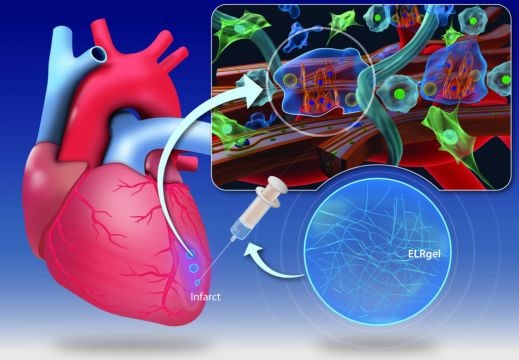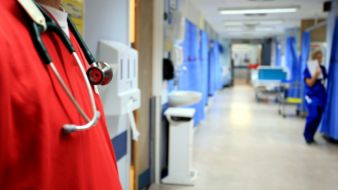Researchers based in Ireland have developed an injectable hydrogel that could help repair and prevent further damage to the heart muscle following a heart attack.
The results of their research, now been published in the Science Translational Medicine journal, may change the way the heart muscle heals after a heart attack.
Heart disease is currently a leading cause of death, due to the irreversible damage caused to the cardiac tissue during a heart attack and the minimal ability of the tissue to regenerate and repair itself.
The new gel has been developed by researchers at CÚRAM, the Science Foundation Ireland Research Centre for Medical Devices based at NUI Galway, in partnership with BIOFORGE Lab, based at the University of Valladolid in Spain.
According to the research team, current treatments lack an effective method to prevent death and aid cardiac tissue repair following a heart attack.
"This project involved the development and testing of an elastin-based hydrogel derived from a naturally occurring biomaterial in the human body,” Professor Abhay Pandit, project lead and scientific director of CÚRAM said.
"The hydrogel was developed to mimic the environment around the heart following an infarction (tissue death) and then customised to have the ability to protect and promote regeneration of the cardiac tissue.”
Findings
In the first-ever preclinical study of its kind, researchers assessed the therapeutic effect of multiple injections of the hydrogel into the cardiac tissue.
The study demonstrated the gel’s efficacy for cardiac tissue remodelling following a heart attack, they said.
The international research team, which included researchers from Ireland, Spain, Sweden, France and Italy, was able to show that if the hydrogel was injected into the heart muscle shortly after a heart attack, it resulted in less fibrosis (scarring of the cardiac tissue) and an increase in the generation of new blood vessels in the area.
They were also able to observe the rise in the preservation and survival of cardiomyocytes, a type of cell that allows the heart to beat, in the affected area.
Prof Pandit said: "The functional benefits obtained by the timely injection of the hydrogel supports and highlights the potential use of this treatment in the clinic. The next step will be to develop a prototype for a delivery system for the hydrogel."
There is a significant positive histological, biological and functional recovery of the injured heart muscle
Professor Mark Da Costa, a cardiothoracic surgeon at NUI Galway and senior co-author of the study, said: "In this study, we employed a model to specifically look at a type of heart attack that has increased in incidence and is not often treated until the acute phase resolves.
“Scar tissue that forms after the heart attack often remodels negatively, causing future problems like heart failure. The timely injection of this hydrogel appears to change the way the heart muscle heals after a heart attack.
“There is a significant positive histological, biological and functional recovery of the injured heart muscle.
“Work is progressing now to deliver this to the sites of injury in different clinical settings and will be followed with translation into a clinical trial.”
The researchers' full paper can be accessed here.







